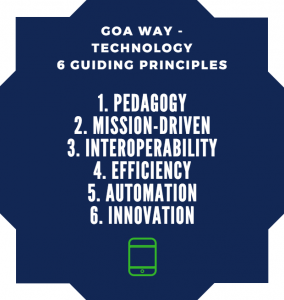6 Guiding Principles for Our School Technology Plan
At GOA, we’ve always had a culture of experimentation and innovation. It is embedded in who we are. During our early years, we fostered this by intentionally maintaining a loose formal technology plan and system. All members of GOA, from staff to faculty, were encouraged to play and innovate with new technology. Some of our best technology initiatives and strategies came from this type of exploration. However, it also led to innovation “in a silo” and an unclear process for taking promising innovations and embracing them as pilots or formal adoptions.
As we matured as an organization, we needed to transition to a formal technology plan that would support our organizational goals. While this evolution may seem obvious, we know from talking to other independent schools, there are many campuses are running without a formal technology plan or with one that is rarely referenced. Over the past year, we’ve thought a lot about what makes a good technology plan and how, once developed, it remains a part of the organization. As we began developing our technology plan, we quickly realized that it needed to be grounded in key principles that would guide our day-to-day actions. In many ways, this mirrored how we view course design and pedagogy. It, as Wiggins says, “begins with the end in mind” and should remain goal-oriented.
While this remains a “living process” for us, one component we’re extremely proud of is the development of our “GOA Way,”which outlines our six technology principles. Our technology plan is intended to be the anchor for our Tech Team; the plan guides decision making and prioritization, not unlike a school or organization’s strategic plan or competencies in our student program. As such, we came up with the following guiding principles for our technology plan:
- Pedagogy: For decisions in our student program and professional learning, we start with pedagogical considerations first. At GOA this means our core competencies and Catalyst Card strategies.
- Mission-driven: Technology adoption begins and ends with clearly defined goals that are mission-driven, not with the tool itself.
- Interoperability: Our different technology tools need to work seamlessly with our existing systems and software.
- Efficiency: The assumed benefit of technology at GOA must outweigh the learning curve for our constituencies.
- Automation: Technology at GOA should seek to eliminate the rote whenever possible and should never add rote activities for staff, faculty, or students.
- Innovation: Any systems built around technology shall continue to facilitate innovation among staff, faculty, and students.

We know students, teachers, and instructional designers must remain the cornerstone of innovative technology at GOA. That’s why we intentionally qualified the “GOA Way” by focusing on “formal implementation.” We knew that if our “principles” meant a “system” for these constituencies, it would only serve to stifle the innovation that has made GOA so successful. This does not preclude us, however, from using the “GOA Way” to ask good questions about educational technology at any level. The role of this system is to facilitate communication regarding tech innovation and make sure it occurs in a collaborative manner.
We certainly have work to do. How does the “GOA Way” inform our technology plan beyond formal adoptions? How do we balance tech systems and innovation? How do we ensure we’re consistently using this language in our conversations? All of this is very much on our mind as we look to build off these principles in years to come.
What principles drive your technology plan? Do you have the same mission-driven philosophy? We’d love to hear your thoughts.
Global Online Academy (GOA) reimagines learning to enable students and teachers to thrive in a globally networked society. Professional learning opportunities are open to any educator. To sign up or to learn more, see our Professional Learning Opportunities for Educators or email hello@GlobalOnlineAcademy.org with the subject title “Professional Learning.” Follow us on Twitter @GOALearning. To stay up to date on GOA learning opportunities, sign up for our newsletter here.

